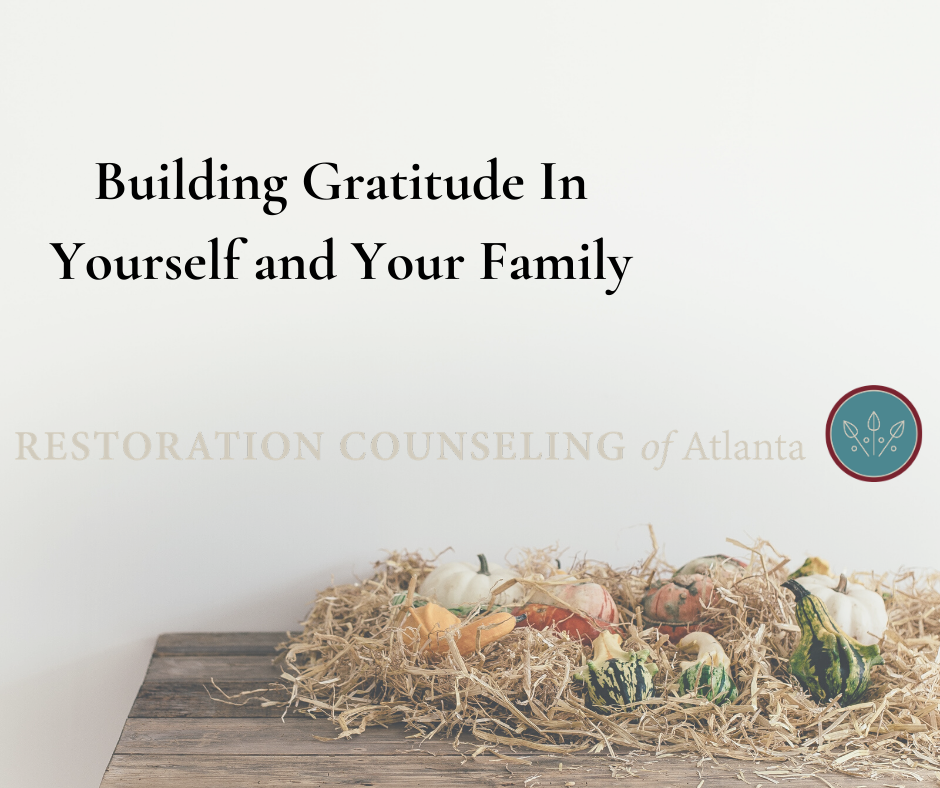November is the time of year when the world tells us to focus on all that we have for which to be thankful. Americans dedicate an entire day to Thanksgiving to be with loved ones and think about our blessings. Appreciation for what we have is certainly cause for praising our God who bestowed these upon us, but gratitude is more complicated and important than just saying thank you. It is a way of shunning the scarcity perspective that the world pushes on us to look instead at a life filled with abundance.
What is gratitude?
Most of us think of gratitude as a feeling of thankfulness and appreciation to someone for good things that happen to us, such as saying “thank you” when someone extends a kindness. While the feeling is definitely part of it, gratitude is much more than a feeling alone.
- It is a recognition of being seen by another: It is typically evoked when one receives costly, unexpected, and intentionally rendered benefits, and is thought to play a key role in regulating the initiation and maintenance of social relationships.
- A choice, an attitude, and a disposition: “We can choose to be grateful, or we can choose to be ungrateful—to take our gifts and blessings for granted.”
- It is purposeful and powerful: From a scientific perspective, gratitude is not just an action: it is a positive emotion that serves a biological purpose to produce longer-lasting positivity.
- A response to a gift: Gratitude is also a form of generosity, of graciously crediting the other for something that was not strictly owed as in an exchange of goods for payment.
Why is gratitude important?
“Be thankful for what you have; you’ll end up having more. If you concentrate on what you don’t have, you will never, ever have enough.” – Oprah Winfrey
Living with gratitude is a way of life that asks us to notice all that is already present and abundant – from the tiniest things of beauty to the grandest of our blessings – and in so doing, to take nothing for granted. Even in the most challenging times, living gratefully makes us aware of and open to the opportunities that are always available— opportunities to learn and grow and to extend ourselves with care and compassion to others.
Over the past two decades, much of the research on happiness can be boiled down to one main prescription: give thanks. Across hundreds of studies, practicing gratitude has been found to increase positive emotions, reduce the risk of depression, heighten relationship satisfaction, and increase resilience in the face of stressful life events, among other benefits. Practicing gratitude not only helps you feel more grounded and peaceful, it also improves your ability to share that love with others, to give back, say thank you, and re-commit to your heart-held values.
Benefits for Mental Health
In terms of mental health, gratitude is an effective tool that can change our attitudes, our perspectives on problems, and our performance. It is very human and quite easy to fall into the habit of not noticing the good in every situation and instead, thinking of all that we wish were different or better. But this can lead to negative thoughts, comparisons to others, and diminishing our own or others’ efforts and achievements. Without gratitude for life itself and the gifts in our lives, those suffering with mental health troubles (depression, anxiety, grief, addiction, trauma, divorce, job loss, and so many more) could stay stuck wearing this lens of negativity and hopelessness. Gratitude can shift the worldview from one of loss and suffering to one of hope and purpose in the pain.
This is not to say that gratitude alone solves anyone’s problems. Used without empathy, platitudes the resemble gratitude could actually damage relationships and push someone deeper into mental turmoil by adding guilt or shame to those who are already stressed. To tell someone to practice gratitude when they are in anguish (e.g. “Be grateful that you experienced love” to the brokenhearted divorcee; “At least they are not in pain anymore” to the newly widowed; “You’ve got everything a kid could want, so why are you unhappy?” to the depressed or anxious teenager) would be unhelpful and, very likely, hurtful.
But when used with love and empathy as part of the overall support you offer, gratitude helps our loved ones tolerate the distress that comes with suffering and builds hope that things will feel better eventually.
How can I build gratefulness into my life and my family’s lives?
Gratitude is supported by daily practices, tools, habits of mind and behaviors that can be learned, translated, and applied to many aspects of our lives. It is also nourished in community and in relationships. Small, grateful acts every day can uplift us, make a difference for others, and help change the world.
Here are some ideas to get you started:
- Breathe deeply and appreciate how breathing is something that doesn’t have to be thought about. It is essential for life, and yet it happens automatically. Breathing is also something used to calm the mind and body in times of distress- it’s always available and simple to access.
- Put stops into your day to look around to notice all that is already present and abundant.
- Start a gratitude journal and spend time every night reflecting on blessings in your day.
- Perform an act of kindness every day for someone else.
- Write thank-you notes to people who have thought of you and shared their favors of time, attention, money, or gifts. Be sure to have your kids do the same.
- At any point during the day, reflect upon one important thing that you have learned in this day. Write down what you have learned.
- Send an email, text, or eCard letting someone know that you are thinking of them today. Expect nothing in return– just share appreciation and acknowledgment.
- Make the decision to see your most challenging moments today as opportunities. What might be making itself known or available to you in hard times? How can you cultivate even small sentiments of gratefulness for the gifts that come from struggle? Reflect on this at the beginning and the end of the day.
- Turn all of the “waiting” moments of the day into moments of heightened awareness. Try to be fully present in these moments to what might be blessings in disguise. Notice that time “between” things is a huge gift.
- If you share a meal with others today, before or while you eat, ask each person to share something for which they are grateful. If eating alone, bring to mind something for which you are grateful and dedicate your meal to that “great fullness.”
- Reach out to someone you know is going through a difficult time. You do not have to have the right things to say, just connect in a meaningful way.
- Notice your hands. Think of all they do for you. Can you imagine what it would be like to offer them your true appreciation at a host of moments each day? Notice how much they help to facilitate what you love in life. Take care of them.
- Before you eat, take a moment to feel grateful to all those who contributed to creating your meal– the farmer who grew the vegetables, the hens that laid the eggs, the workers who harvested the wheat and stocked the food, etc.
- Each time you turn on the tap, pause to feel grateful that you have access to running water, unlike so many in the world today.
- Ask someone a sincere question. There is hardly a more precious gift than true inquiry and deep listening.
- Make a financial contribution to a non-profit organization doing work that you value. Accompany that gift with a note of appreciation for how hard people are working to advance missions in which you believe. Feel interconnected.
- When things are not going as you had planned, ask yourself, “What is the opportunity for gratefulness in this moment?”
- Practice “mental subtraction.” That involves considering the many ways in which important, positive events in your life—such as a job opportunity or educational achievement—could have never taken place, and then reflecting on what your life would be like without them.
- Temporarily give up pleasurable activities and then come back to them later, this time with greater anticipation and excitement in order to savor the happiness it brings to you.
- If there is anyone in your life to whom you feel you’ve never properly expressed your gratitude, write a thoughtful, detailed letter of gratitude to them, then deliver it to them in person and read it aloud. This will increase your own feelings of gratitude and happiness while also making the other person feel appreciated and valued; it may also deepen your relationship with them.
- Set up a holiday tree in a common area of your home and provide colorful paper cut-out ornaments in a bowl next to it, along with writing utensils. Encourage your family to write their gratitude on a paper cut-out and hang it on the tree. Together, the ornaments will be a daily visual reminder of gratitude for the whole season.
- Have family members sit one at a time on a “hot seat.” Everyone else tells the person in the hot seat why they appreciate them and expresses gratitude for their role in the family, achievements earned, and any help or kindnesses recently given, etc.
- Giving back as a family is a positive, bonding experience that naturally boosts our gratitude. Choose volunteer activities that are best done together and take teamwork, such as a park cleanup, where results will be immediately evident.
- Identify 3 things that you take for granted but are actually very thankful for.
- Identify 3 people who had a significant and positive impact on your life.
Remember that gratitude is not a one-and-done activity. It’s a daily exercise that becomes a healthy habit.
So start practicing today and you will gain the peace of God for Philippians 4:6-7 says:
“Do not be anxious about anything, but in every situation, by prayer and petition, with thanksgiving, present your requests to God. And the peace of God, which transcends all understanding, will guard your hearts and your minds in Christ Jesus.”
“Gratitude unlocks the fullness of life. It turns what we have into enough, and more. It turns denial into acceptance, chaos to order, confusion to clarity. It can turn a meal into a feast, a house into a home, a stranger into a friend. Gratitude makes sense of our past, brings peace for today, and creates a vision for tomorrow.” – Melody Beattie
Roswell location
paige@restorationcounselingatl.com, ext. 157
Paige is committed to providing a safe and comfortable atmosphere, where clients can explore the challenges they are facing. She also believes in addressing the individual’s entire personhood, assessing needs in all domains of life instead of focusing solely on mental health needs. Paige works with adults and teens around issues of depression, anxiety, mood disorders, relationship issues, trauma, PTSD, and life transitions.
References
Arrien, Angeles. (2013). Living in gratitude: A journey that will change your life. Sounds True Publishing, Louisville, CO.
Gratefulness.org (n.d.). What is Gratitude? Retrieved from: https://gratefulness.org/resource/what-is-gratitude/
Jones, M. (2018, Feb 28). Inc. com. 7 Easy gratitude exercises that make even the most pessimistic people happier: Here’s a fast way to improve your mood (and life). Retrieved from https://www.inc.com/matthew-jones/7-simple-gratitude-practices-that-make-all-pessimistic-people-happier.html
Positivepsychology.com (28-08-2019). What is gratitude and why is it so important? Retrieved from: https://positivepsychology.com/gratitude-appreciation/


 by
by